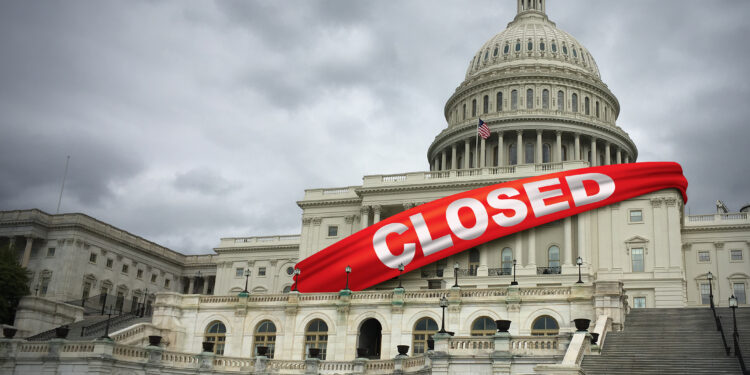WASHINGTON – On Wednesday, Oct 1, the federal government shutdown. As of Oct. 7 the Senate failed to pass five stopgap funding bills, temporary spending bills that would allow federal government operations to continue when final appropriations have not been approved by Congress and the President. The shutdown came after an extension for healthcare tax credit subsidies failed to pass in Congress. The tax credits, originally put in place in 2021 during the Covid-19 Pandemic, are now set to expire. This marks the first government shutdown for the current Trump administration, and the third under his leadership. When a government shutdown occurs, it affects the Tribal nations, particularly smaller Tribes, that rely on federal funding to provide services for their citizens.
According to Muscogee (Creek) Nation Press Secretary Jason Salsman, the government shutdown will have minimal effect on Tribal services offered by the Nation.
“We’re confident in all of our Tribal systems. We’ve been through these instances before,” Salsman said. “We feel that we’re in a good position and are prepared to be able to handle any interruptions in service. And we believe that those in Washington D.C. will figure this out sooner than later. But in the meantime, we have a one hundred percent self sustainable health system and many of our programs will be able to get by at this time. So we’re staying in close connection with our Washington D.C. lobbyists and our folks in Washington, but we’re also staying with regular meetings with different areas of finance and federal programs to make sure that there’s limited interruption.”
Cherokee Nation Principal Chief Chuck Hoskin Jr. released a public statement on the shutdown. Just like MCN, the Cherokee Nation health system will not be affected by the shut down. He called for federal leaders to come together to find a solution. The statement reads:
The Cherokee Nation maintains sufficient financial stability to navigate the immediate impacts of a federal government shutdown, but we’re hopeful that Congress’ foresight to provide an advance appropriation for the Indian Health Service will prevent any severe disruptions as experienced during the 2013 and 2018 shutdowns. I urge both sides of the aisle to work on a path forward and reopen the government as soon as possible and call on the administration to honor the government’s Treaty and Trust responsibilities, avoid needless cuts to Tribal programs and personnel, and use its authorities to minimize harm to tribes and tribal citizens.
According to the National Congress of American Indians, Indian Health Services will not be affected by the government shutdown. However, smaller tribes could see effects in their programs and services. According to Cedar Rock Alliance Vice President of Intergovernmental Affairs Liz Carr (Sault Ste. Marie Tribe of Chippewa Indians), a shutdown is in violation of treaties.
“Our intention is to remind those in power that Indian Country can’t afford a shutdown.” Carr said. “Shutting down is an abdication of the trust and treaty responsibilities. If they do shut down they need to take prompt action to protect Indian Country.”
The Associated Press reported that Medicare and Medicaid are expected to continue offering services, however delays may be expected for some services. According to comments made from National Economic Council Director Kevin Hassett on CNN, federal employees now face furloughs and firings. Senator Mike Rounds (R- South Dakota) appeared on PBS News Hour to discuss how to avoid disruptions to services and possible furloughs moving forward. His answer is to simply open up the government again.
“There really is no other way to start than starting government and opening it up again,” Rounds said. “And that’s part of the message that we’re trying to share is, there’s lots of ways using regular order, the traditional way in which we do appropriations and everything, to accomplish a lot of really good things in the Senate.”
Oklahoma Senator James Lankford appeared on KOKI Fox 23 to explain the holdup in Congress. According to Lankford, the core issue is over a proposed seven-week stopgap funding bill. The government is still determining which federal positions are essential and non essential, or which jobs can and can not be worked remotely. Those working positions that are deemed non essential may lose their jobs altogether. Lankford also said those seeking certain government services will find offices empty.
“Some people are trying to get a permit, do oil and gas development, reach out to a National Park area or other certain offices. They will suddenly find the person they were going to call is now on furlough, they’re not there. They can’t issue that permit during a government shutdown,” Lankford said.
Coincidentally on Oct. 1 the Claremore Indian Hospital officially celebrated its transfer of ownership to the Cherokee Nation after a negotiation process that lasted over a year. According to Cherokee Nation, patients will not see a disruption of service due to the transfer or the shutdown. Likewise the Indian Health Care Resource Center in Tulsa announced the shutdown will have no effect on their services to tribal citizens.
Government shutdowns can vary in length. The Obama administration saw one government shutdown that lasted 16 days in 2013. The Trump administration saw two government shutdowns in 2018, the first lasting two days, the second lasting 34.
“Government shutdowns are kind of like a war. It’s easy to start, it’s hard to stop. Once you shut the government down you don’t know how long it takes.” Lankford said.
The next Senate vote on a stopgap funding bill will be on Monday, Oct. 6. The Senate met to convene at 3 p.m. (ET) but there are no reports of a vote result yet.





